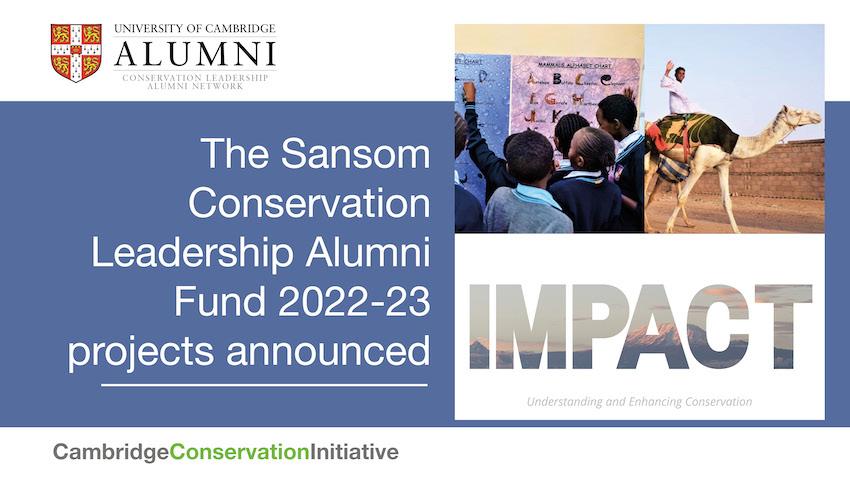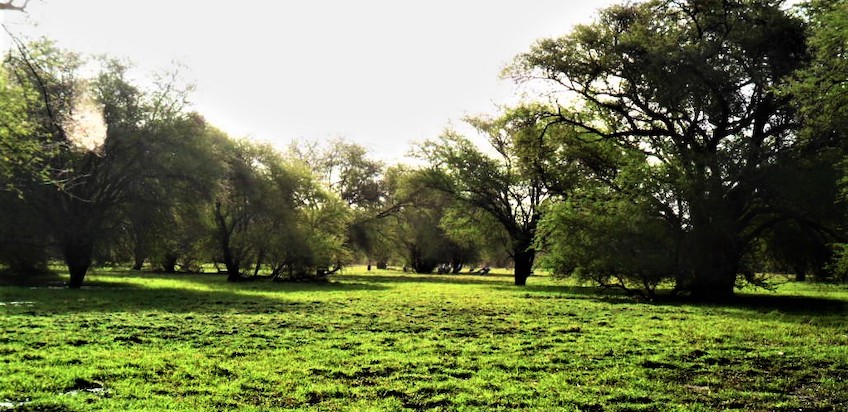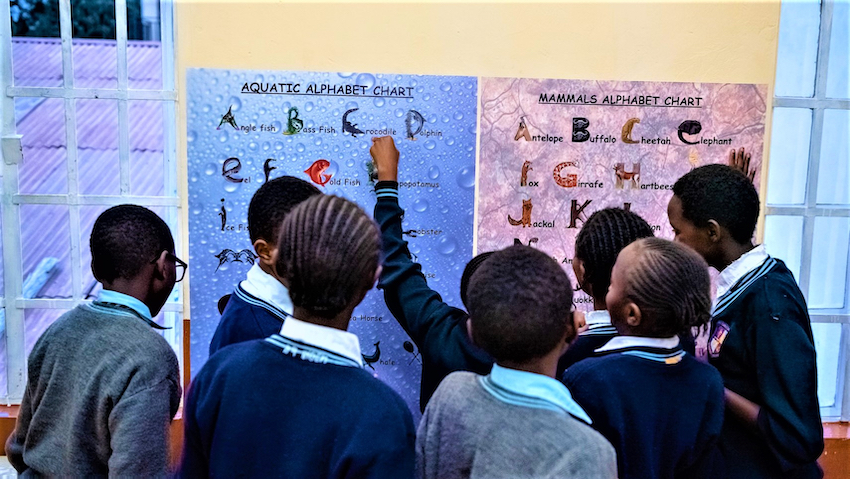
Submitted by S. Bolderson on Tue, 17/01/2023 - 14:09
From working with donors to enhance conservation impact; to using local ecological knowledge in Sudan to maximise conservation values; and using art for conservation in education in Kenya, three Sansom Conservation Leadership Alumni (SCLA) Fund projects have been announced for the 2022-23 round.
The SCLA Fund has been established with thanks to the generosity of Robert Sansom to support high impact conservation projects undertaken by alumni from the University of Cambridge Masters in Conservation Leadership. Now in it’s second year, the SCLA Fund received nine applications. The majority of applications were submitted from alumni who graduated in the last three years and projects had a focus on Asia, Africa and South America. From these nine projects, three were awarded funding by a Selection Panel of individuals from the Cambridge Conservation Initiative and the alumni network.
Course Director, Professor Chris Sandbrook, said ‘This dedicated fund allows us to support our alumni as they take the lead in conservation after graduation. After a successful pilot year, I am so excited to see the second round of projects flourish and I am extremely grateful to Robert Sansom for providing this generous support.’
Enhancing conservation impact
Enhancing conservation impact plans to deepen the understanding of conservation impacts and co-create a more impactful and effective framework for doing conservation that accelerates conservation impacts.
This project aims to mainstream impact-based conservation by developing a new approach to understanding effectiveness. This will increase conservation impacts on the ground by addressing the key barriers to practitioner-led and donor-funded impact evaluations. The team will work with pilot teams of donors and practitioners and to offer expertise, space, and capacity to design, monitor, and report on these crucial impact frameworks. They will work with donors and practitioners to understand their conservation work and help them make more informed decisions that result in increased conservation impacts and return on the donor’s and the practitioner’s investments using our impact framework.
Project lead Salisha Chandra from the 2019-20 cohort said ‘Our project hopes to embed impact into the heart of decision making by working with a small group of donors and their portfolios. The SCLA Fund grant comes to us at exactly the right time, allowing us to build on lessons learnt and experiences gained to catalyse much needed, critical conservation impact.’
Maximizing the conservation values of local ecological knowledge
This project aims to harness the expertise, cultural knowledge, and values of local and indigenous communities for effective conservation in the Dinder National Park (DNP), which is one of the oldest and largest protected areas in Sudan. The park hosts diverse fauna and flora species and represents a major flyway of migratory birds. Ethnic and cultural diversity greatly contributes to the uniqueness of the DNP; there are about 48 communities, including indigenous communities, live within and around the park boundaries. Local knowledge, beliefs, and cultural values have largely shaped local communities’ interaction with the DNP. However, despite its substantial values, local ecological knowledge of the DNP’s communities has never been comprehensively documented neither integrated into conservation strategies. This project aims to raise awareness on the conservation values of local ecological knowledge and facilitate integration of local ecological knowledge into conservation management and strategies.
Elimisha outreach project: using art for conservation
In recent times, the climate crisis has accelerated loss of wildlife, water scarcity, pollution and other environmental issues fuelling anxiety and transforming life as we know it. This scenario is currently being experienced in Laikipia central Kenya. The once thriving conservation landscape is quickly changing affecting livelihoods and driving biodiversity loss. Overall, Scientists warn that ignoring climate change and biodiversity loss will yield "untold suffering" for humanity. The Elimisha outreach project will work with teachers and students to raise climate change awareness and undertake practical activities to protect and guard their immediate environment and livelihoods through a creatively designed board game.
This project aims to create awareness and increase knowledge on climate change impacts, and to foster positive attitudes in young learners in Laikipia County, whilst building a network of young champions of sustainable practices and conservation.
Updates from the SCLA Fund 2021-22:
The first of the three projects from the pilot year of the fund ‘Conservation ActionLAB for civic involvement in strategic conservation decision-making’ is completed. This project prototyped the first Conservation ActionLAB, a ‘war room’ type of space where four UCCLAN alumni came together to respond to a conservation emergency, the Andean Chocó Biosphere Reserve threatened by mining in Ecuador. The team rapidly designed an advocacy campaign for civic involvement in key decision-making which is being implemented by Project Lead, Carolina Proana Castro (2015-16) from Fundación Futuro.
Now midway through the two year project, the ‘Global Green Recovery Collaborative’ a virtual platform designed to engage and connect conservation practitioners working in green recovery, continues to grow in number of alumni contributors and green recovery initiatives, after a period of beta testing there was a soft launch of the website.
‘Education in the Pantanal’ is a project designed to teach youth from traditional and local communities about the biodiversity in Pantanal which is at peril from fire. In its first six months the project developed workshop content, printed educational materials, contacted school directors and gave workshops to teachers from public schools in two municipalities, Poconé-MT and Barra do Garças-MT, in northern Pantanal and its outskirts. They are taking the lessons learned from these and are continuing to deliver workshops in different locations. The project which is due to finish this summer.



